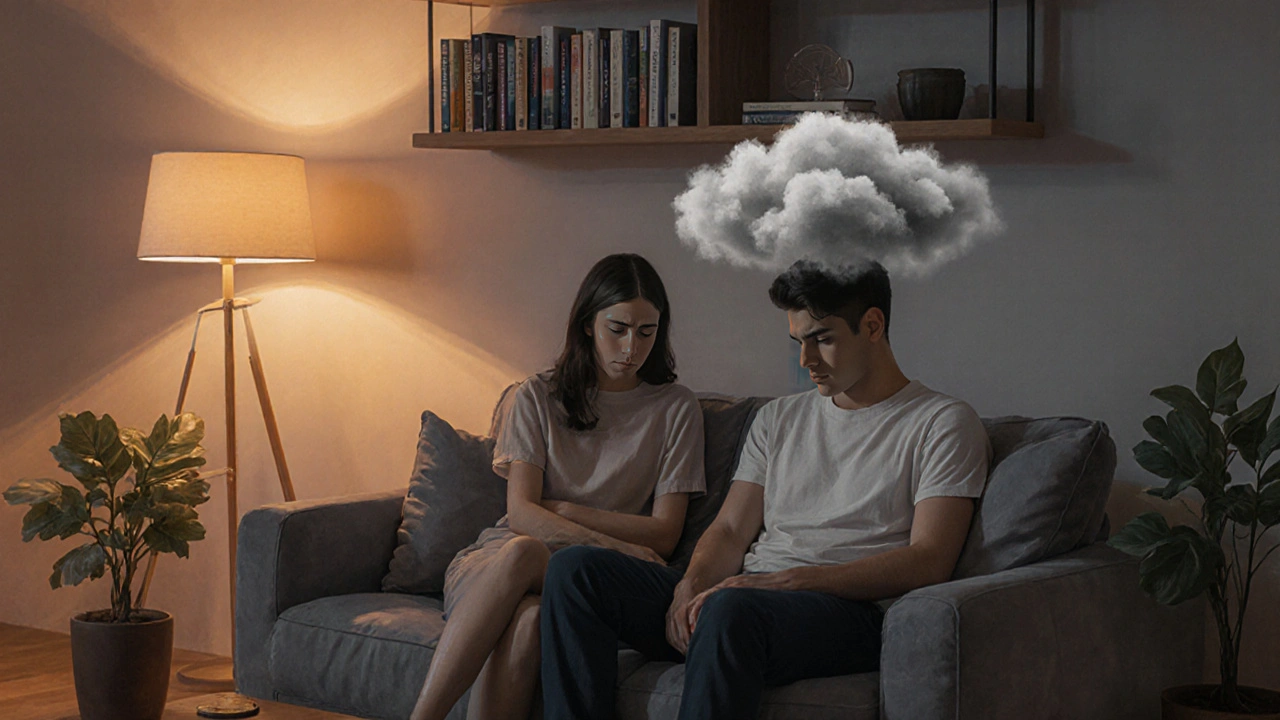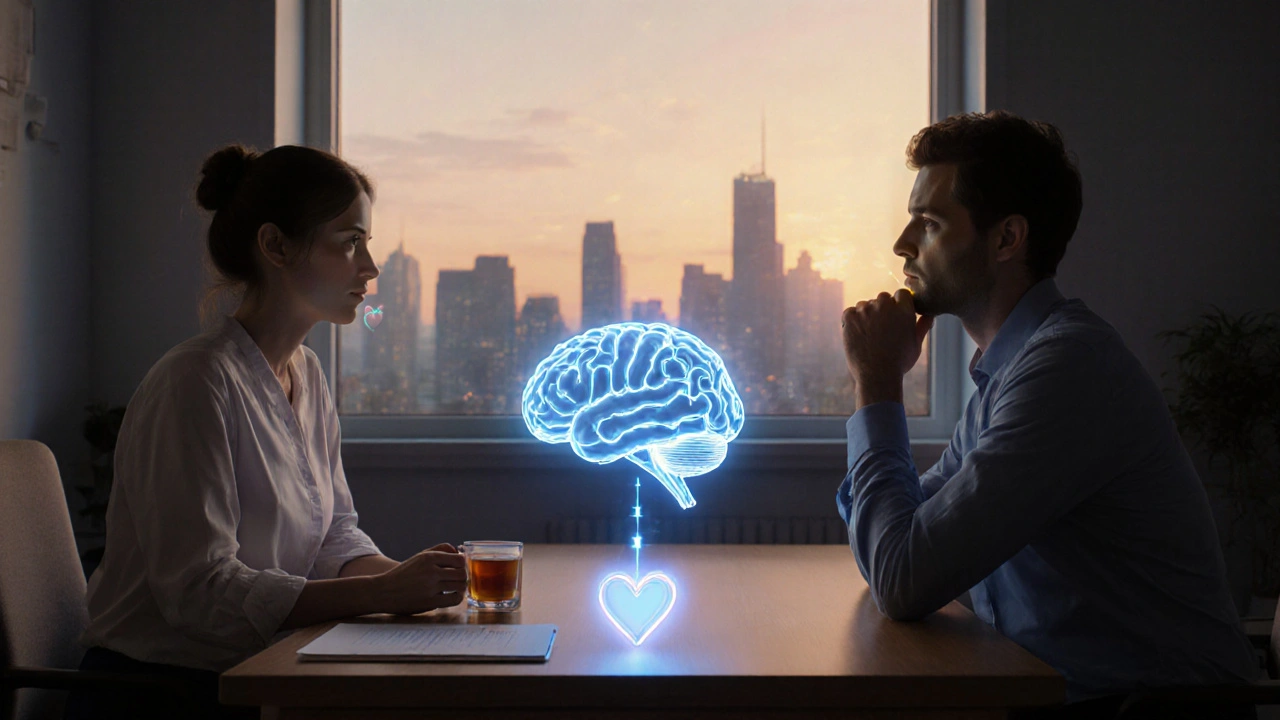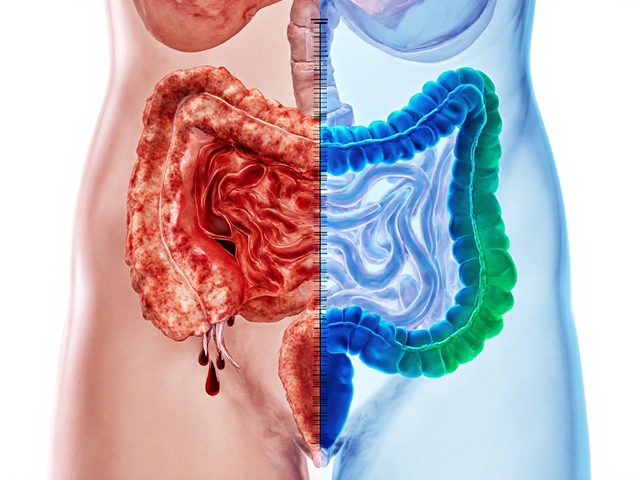
Low libido is a reduced interest in sexual activity that can affect anyone regardless of age or gender. While it often appears as an isolated complaint, research shows it frequently mirrors deeper mental health challenges. Understanding that link is the first step toward lasting relief.
Why mental health matters for sexual desire
When the brain’s chemistry shifts, the body follows. Depression is a mood disorder marked by persistent sadness, loss of pleasure, and fatigue. Studies from the National Institute of Mental Health estimate that up to 70% of people with depression report diminished libido. The connection isn’t just emotional; low serotonin and dopamine levels-neurotransmitters that regulate mood-also dampen arousal pathways.
Anxiety fuels a constant state of hyper‑arousal, which paradoxically makes relaxation for intimacy difficult. A 2023 meta‑analysis found that 55% of anxiety patients experienced a drop in sexual desire, often linked to muscle tension and intrusive thoughts. When the mind is on edge, the body’s "go" signal for sex gets muted.
Stress triggers cortisol release. Chronic cortisol spikes suppress sex hormones like testosterone and estrogen, directly lowering drive. Even short‑term work stress can shave off 20% of the testosterone circulating in the bloodstream.
Hormonal and physiological culprits
Beyond the brain, hormones play a starring role. Testosterone is the primary androgen that fuels libido in both men and women. Levels naturally decline with age, but chronic illness, obesity, and certain medications can accelerate the drop. Low testosterone often co‑occurs with depressive symptoms, creating a feedback loop.
Medications designed to treat mental illness can unintentionally curb desire. Selective serotonin reuptake inhibitors (SSRIs) increase serotonin to lift mood, yet they also blunt dopamine pathways involved in pleasure. Up to 40% of SSRI users report sexual side‑effects, ranging from delayed orgasm to flat desire.
Relationship and lifestyle factors
Intimacy thrives on emotional safety. Relationship satisfaction measures how partners perceive support, communication, and trust. Low scores often predict a dip in sexual interest, independent of physical health. Couples who argue frequently or feel disconnected report a 30% higher chance of experiencing low libido.
Sleep, diet, and exercise round out the picture. Poor sleep quality reduces hormone production and raises cortisol, both of which hurt desire. A 2022 sleep study showed that participants sleeping less than six hours per night had a 25% drop in reported sexual desire. Likewise, diets high in processed sugars and low physical activity correlate with reduced dopamine sensitivity, nudging libido downward.

How to break the cycle: a step‑by‑step roadmap
- Screen for mental health conditions: Use a brief questionnaire (PHQ‑9 for depression, GAD‑7 for anxiety) to identify underlying issues.
- Consult a healthcare professional about hormone levels: a simple blood test can reveal testosterone, estrogen, and thyroid status.
- Review medications: If you’re on an SSRI, discuss alternatives or dose adjustments with your prescriber.
- Prioritize sleep hygiene: aim for 7‑9 hours, limit screen time before bed, and keep a consistent wake‑up schedule.
- Incorporate regular aerobic exercise: 150 minutes per week improves circulation, boosts endorphins, and can raise testosterone by up to 15%.
- Address relationship gaps: schedule weekly “connection talks” without distractions, and consider couples therapy if communication stalls.
- Practice stress‑reduction techniques: mindfulness meditation, deep‑breathing, or yoga reduce cortisol and improve mood.
Comparing the main drivers of low libido
| Cause Category | Primary Driver | Typical Symptoms | Common Interventions |
|---|---|---|---|
| Psychological | Depression, anxiety, chronic stress | Low mood, fatigue, intrusive thoughts, reduced desire | Cognitive‑behavioral therapy, mindfulness, lifestyle changes |
| Hormonal | Low testosterone, thyroid imbalance, menopause | Energy loss, mood swings, decreased libido | Hormone replacement, diet optimization, exercise |
| Medication‑related | SSRIs, antihypertensives, antipsychotics | Delayed orgasm, anorgasmia, flat desire | Medication review, dose adjustment, drug holidays |
Related concepts you might explore next
Understanding the low libido‑mental health link opens doors to deeper topics such as sexual dysfunction treatment, mind‑body therapies, and the role of neurotransmitter balancing supplements. For readers interested in a narrower focus, consider reading about “Testosterone Replacement Therapy for Men Over 40” or “Mindful Sex Practices for Couples”. Both sit within the broader health cluster and complement the strategies discussed here.

Frequently Asked Questions
Can low libido be the first sign of depression?
Yes. Many people notice a drop in sexual interest before feeling persistent sadness. Because libido relies on dopamine pathways, early mood shifts often manifest as reduced desire.
Do all antidepressants affect sexual desire?
Not all, but SSRIs and SNRIs are the most common culprits. Bupropion, for example, tends to have a neutral or even positive effect on libido.
How long does it take to see hormonal improvement after lifestyle changes?
Most men notice modest testosterone gains within 8‑12 weeks of consistent exercise and weight loss. Women may experience smoother hormonal swings during menopause after 3‑6 months of balanced nutrition and stress reduction.
Is therapy alone enough to restore desire?
Therapy can address the psychological roots, but if hormonal or medication factors are present, a medical evaluation is essential for full recovery.
Can improving sleep really boost libido?
Absolutely. Quality sleep restores hormone production, lowers cortisol, and refreshes neurochemical balance-all critical for healthy sexual desire.




15 Comments
Low libido isn’t just a ‘sex‑drive’ problem, it’s a red flag for deeper issues.
Sure, the pharma giants love to hide the fact that they push SSRIs like they’re candy – the side‑effects? A full‑blown libido apocalypse. It’s almost as if they’d rather keep us sedated than sane. Meanwhile, the “miracle” pill does wonders for the market’s bottom line, not our bedroom life.
Interesting take, but the data on stress‑induced cortisol spikes is solid. Chronic anxiety can shut down the endocrine axis faster than a bad coffee habit. If you’re not sleeping, hormones won’t cooperate.
Honestly, everyone loves to blame “stress” while ignoring the fact that modern relationships are a battlefield. If you can’t communicate, no amount of serotonin will fix the spark.
Yo, totally agree that lifestyle matters. I’ve seen mates turn things around just by hitting the gym and ditching late‑night scrolling. Small changes, big results.
That’s spot on – keep it simple, get enough sleep, stay active and talk it out.
When we examine the intricate relationship between mental health and sexual desire, it becomes evident that a multidimensional approach is indispensable. First, the neurochemical landscape must be scrutinized; serotonin, dopamine, and norepinephrine each play pivotal roles in modulating libido. Second, chronic cortisol exposure, often a byproduct of persistent stress, can suppress gonadal hormone synthesis, thereby diminishing arousal. Third, the psychosocial environment, encompassing relationship satisfaction and communication patterns, exerts a profound influence on sexual motivation. Fourth, pharmacotherapy, particularly selective serotonin reuptake inhibitors, may inadvertently attenuate dopaminergic pathways essential for pleasure. Fifth, lifestyle interventions such as aerobic exercise have been shown to elevate endogenous testosterone levels by up to fifteen percent in a relatively short timeframe. Sixth, sleep hygiene is not a peripheral concern; inadequate restorative sleep disrupts the hypothalamic‑pituitary‑adrenal axis, leading to hormonal imbalances. Seventh, nutritional adequacy, especially adequate intake of zinc and healthy fats, supports steroidogenesis. Eighth, mindfulness practices can recalibrate the autonomic nervous system, reducing sympathetic overdrive that stifles intimacy. Ninth, when hormonal deficiencies are confirmed via laboratory assessment, targeted replacement therapy may be warranted, albeit with vigilant monitoring for adverse effects. Tenth, collaborative care models that integrate mental health professionals, endocrinologists, and sexual health specialists yield the most robust outcomes. Eleventh, patient education empowers individuals to recognize early signs of libido decline, facilitating timely intervention. Twelfth, couples therapy can address relational discord that perpetuates a feedback loop of anxiety and desire suppression. Thirteenth, regular follow‑up ensures that therapeutic adjustments are made in response to evolving clinical pictures. Fourteenth, cultural attitudes toward sexuality should be considered, as stigma can impede help‑seeking behavior. Fifteenth, ultimately, restoring sexual desire is a holistic endeavor that requires synchronized attention to mind, body, and relational dynamics.
Wow, a whole dissertation in a Reddit comment – impressive 🙄.
One cannot help but ponder the existential weight of desire itself-does the yearning for intimacy mirror our deeper longing for meaning? In the tapestry of human experience, libido weaves threads of vulnerability, power, and identity. When that thread frays, the entire fabric seems to tremble, echoing the philosophical musings of ancient thinkers who questioned the nature of pleasure and purpose. Yet, in the modern clinic, such reflections translate into tangible interventions: medication adjustments, therapy, and the simple act of sharing a quiet moment.
Indeed, the philosophical angle is interesting, but practical steps like regular check‑ups and open communication remain essential.
I appreciate the comprehensive overview presented herein; it encapsulates both physiological and psychological dimensions with clarity and scholarly rigor.
Thank you for the thoroughness. I will consider discussing these points with my doctor at the next appointment.
From a holistic perspective, integrating gentle yoga and mindful breathing can gradually restore the body’s natural rhythm, supporting both mental equilibrium and sexual vitality.
Sounds like a feel‑good guru session. Meanwhile, the big pharma lobby keeps pumping out meds that crash your drive.
All this talk about hormones makes me wonder if we’re just chasing a chemical excuse for deeper issues.